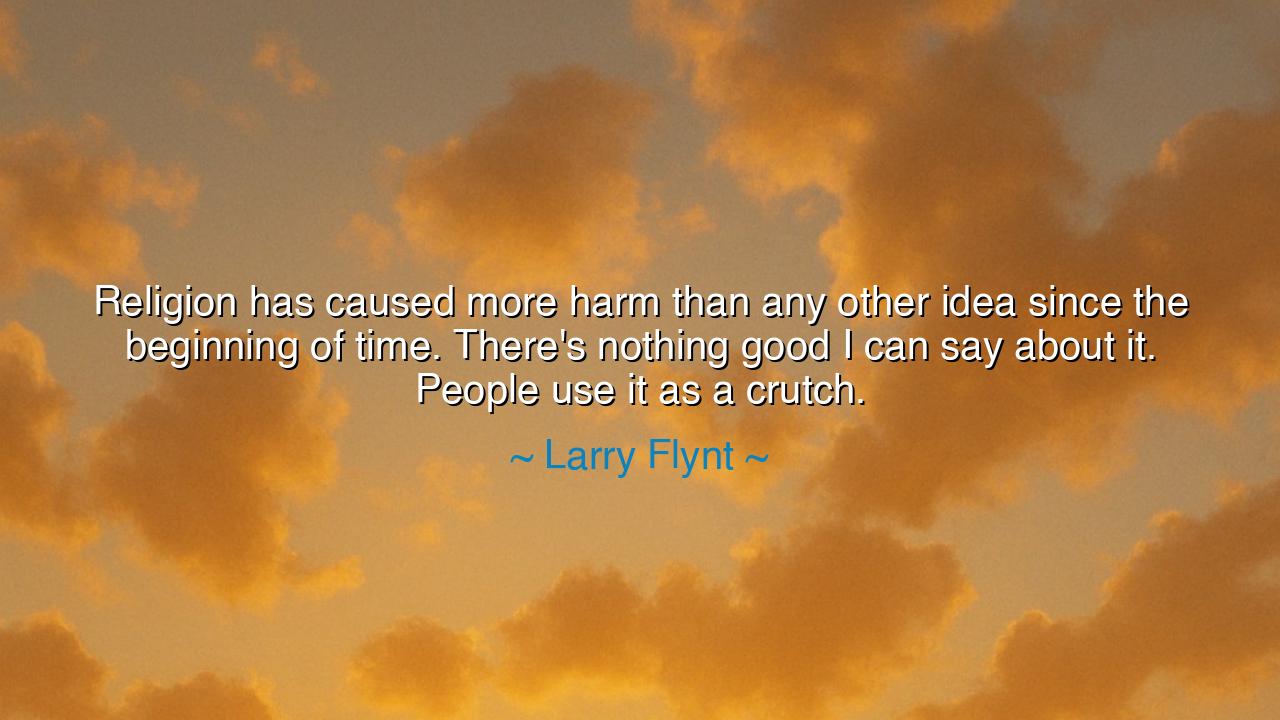
Religion has caused more harm than any other idea since the
Religion has caused more harm than any other idea since the beginning of time. There's nothing good I can say about it. People use it as a crutch.






"Religion has caused more harm than any other idea since the beginning of time. There's nothing good I can say about it. People use it as a crutch." These words, spoken by Larry Flynt, provoke a sharp and unrelenting reflection on the role of religion in shaping human history. It is a sentiment that calls forth centuries of strife, of bloodshed, and of blind adherence to dogma. Though it may seem harsh, this observation beckons us to examine the darker side of religion, where it has been wielded as a tool of control, manipulation, and conflict.
In the annals of history, we find countless examples of religion being used not as a force for peace or love, but as a means of oppression. The Crusades, where Christians set forth to reclaim Jerusalem from the Muslims, led to the deaths of thousands, if not millions, over centuries of religious wars. In the name of faith, entire civilizations were destroyed, and cultures erased. This is not an isolated incident but a reflection of the very nature of religion in its darker forms—used to justify violence, hatred, and the subjugation of others. And so, Flynt's words ring true: religion has, at times, served as the spark for great conflict rather than a balm for human suffering.
Yet, we must not forget the words of the philosopher Friedrich Nietzsche, who declared that "God is dead," not in blasphemy, but in the realization that the structures of religion no longer held sway over the modern mind. Nietzsche saw the crutch of religion as something that humanity had outgrown, a structure that had once provided solace but had now become an impediment to true human flourishing. Religion, in his view, had evolved from a guiding light into a cage, stifling creativity and the spirit of the individual. For Nietzsche, just as Flynt suggests, religion became an excuse for individuals and societies to avoid confronting the harsh realities of life and the complexities of the human condition.
But let us not be mistaken, for religion is not inherently evil, nor is it beyond redemption. There are countless examples throughout history where faith has been a source of profound good—where it has lifted the poor, comforted the oppressed, and inspired acts of unparalleled charity. The ancient Indian concept of ahimsa, championed by figures such as Gandhi, called for non-violence, compassion, and selfless service to others. His devotion to truth, driven by his religious beliefs, led to a nonviolent revolution that freed India from colonial rule. Yet, even in Gandhi's time, religion was not universally a force for peace—it was, at times, a source of conflict and division, as we witnessed during the brutal partition of India and Pakistan.
This duality of religion—both a potential force for good and a tool of harm—calls us to a place of deep contemplation. Religion can indeed be a crutch, a means by which individuals avoid facing the challenges of life directly. It can be used to justify actions that run contrary to the very principles of morality and justice it claims to uphold. Yet, it also has the power to lift the soul, to offer comfort in times of despair, and to unite people in the pursuit of higher ideals. The lesson here is not to dismiss religion outright but to approach it with critical discernment, acknowledging both its potential for harm and its capacity to inspire.
And so, we are called to action—not to reject religion wholesale, but to seek the wisdom to use it as a force for good. Let us rise above the crutch of blind faith and embrace a faith that challenges us to be better, to think for ourselves, and to act justly. We must recognize that religion is not a solution to life's struggles, but a framework that can either strengthen or weaken our resolve. It is up to each of us to choose how we engage with it, whether as a guiding star or as a crumbling relic of the past. In the end, the truth lies not in the words of any religion but in the actions we take, the compassion we show, and the justice we uphold in our lives.
Thus, let us move forward with wisdom, aware that the crutch of religion can hold us back or elevate us, depending on how we choose to wield it. Let us embrace the power of critical thought, challenge the ideologies that seek to divide us, and build a world where compassion, justice, and freedom reign. Let us remember that it is not the crutch that determines our strength, but the courage with which we walk. Religion may be a part of our journey, but it is not the entirety of it. The fullness of life, the richness of the human spirit, lies in how we live, love, and act in the world.






AAdministratorAdministrator
Welcome, honored guests. Please leave a comment, we will respond soon